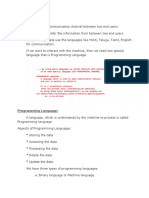Creating Hello Java Example
Uploaded by
Ravi RathodCreating Hello Java Example
Uploaded by
Ravi RathodJava Programming
www.adritsolutions.com
Creating hello java example
class Simple{
public static void main(String args[]){
System.out.println("Hello Java");
}
}
Output: Hello Java
Program of factorial number.
class Operation{
static int fact(int number){
int f=1;
for(int i=1;i<=number;i++){
f=f*i;
}
return f;
}
public static void main(String args[]){
int result=fact(5);
System.out.println("Factorial of 5="+result);
}
}
Program of fibonacci series.
class Fabnoci{
public static void main(String...args)
{
int n=10,i,f0=1,f1=1,f2=0;
for(i=1;i<=n;i++)
{
f2=f0+f1;
f0=f1;
f1=f2;
f2=f0;
System.out.println(f2);
}
}
}
Java Programming
www.adritsolutions.com
Program of armstrong number.
class ArmStrong{
public static void main(String...args)
{
int n=153,c=0,a,d;
d=n;
while(n>0)
{
a=n%10;
n=n/10;
c=c+(a*a*a);
}
if(d==c)
System.out.println("armstrong number");
else
System.out.println("it is not an armstrong number");
}
}
Program of checking palindrome number.
class Palindrome
{
public static void main( String...args)
{
int a=242;
int n=a,b=a,rev=0;
while(n>0)
{
a=n%10;
rev=rev*10+a;
n=n/10;
}
if(rev==b)
System.out.println("it is Palindrome");
else
System.out.println("it is not palinedrome");
}
}
Program of swapping two numbers without using third variable.
class SwapTwoNumbers{
Java Programming
www.adritsolutions.com
public static void main(String args[]){
int a=40,b=5;
a=a*b;
b=a/b;
a=a/b;
System.out.println("a= "+a);
System.out.println("b= "+b);
}
}
Program of factorial number by recursion
class FactRecursion{
static int fact(int n){
if(n==1)
return 1;
return n*=fact(n-1);
}
public static void main(String args[]){
int f=fact(5);
System.out.println(f);
}
}
Simple Example of Object and Class
Public class Student{
int id; //data member (also instance variable)
String name; //data member(also instance variable)
public static void main(String args[]){
Student s1=new Student();//creating an object of Student
System.out.println(s1.id+" "+s1.name);
}
}
Output: 0 null
Java Programming
www.adritsolutions.com
Example of Object and class that maintains the records of students
class Student{
int rollno;
String name;
void insertRecord(int r, String n){ //method
rollno=r;
name=n;
}
void displayInformation(){System.out.println(rollno+" "+name);}//method
public static void main(String args[]){
Student s1=new Student();
Student s2=new Student();
s1.insertRecord(111,"Name1");
s2.insertRecord(222,"Name2");
s1.displayInformation();
s2.displayInformation();
}
}
Output: 111 Name1
222 Name2
public class Rectangle{
int length;
int width;
void insert(int l,int w){
length=l;
width=w;
}
void calculateArea(){
System.out.println(length*width);
}
public static void main(String args[]){
Rectangle r1=new Rectangle();
Rectangle r2=new Rectangle();
Java Programming
www.adritsolutions.com
r1.insert(11,5);
r2.insert(3,15);
r1.calculateArea();
r2.calculateArea();
}
}
Output: 55
45
Public class Calculation{
void fact(int n){
int fact=1;
for(int i=1;i<=n;i++){
fact=fact*i;
}
System.out.println("factorial is "+fact);
}
public static void main(String args[]){
new Calculation().fact(5); //calling method with annonymous object
}
}
Output: Factorial is 120
public class Rectangle{
int length;
int width;
void insert(int l,int w){
length=l;
width=w;
}
void calculateArea(){System.out.println(length*width);}
public static void main(String args[]){
Rectangle r1=new Rectangle();
Rectangle r2=new Rectangle();//creating two objects
r1.insert(11,5);
r2.insert(3,15);
Java Programming
www.adritsolutions.com
r1.calculateArea();
r2.calculateArea();
}
}
Output: 55
45
Example of Method Overloading by changing the no. of arguments
class Calculation{
void sum(int a,int b){System.out.println(a+b);}
void sum(int a,int b,int c){System.out.println(a+b+c);}
public static void main(String args[]){
Calculation obj=new Calculation();
obj.sum(10,10,10);
obj.sum(20,20);
}
}
Output: 30
40
Example of Method Overloading by changing data type of argument
class Calculation{
void sum(int a,int b){System.out.println(a+b);}
void sum(double a,double b){
System.out.println(a+b);
}
public static void main(String args[]){
Calculation obj=new Calculation();
obj.sum(10.5,10.5);
obj.sum(20,20);
}
}
Output: 21.0
40
Example of default constructor
class Bike{
Java Programming
www.adritsolutions.com
Bike(){System.out.println("Bike is created");}
public static void main(String args[]){
Bike b=new Bike();
}
}
Example of default constructor that displays the default values
class Student{
int id;
String name;
void display(){System.out.println(id+" "+name);}
public static void main(String args[]){
Student s1=new Student();
Student s2=new Student();
s1.display();
s2.display();
}
}
Output: 0 null
0 null
Example of parameterized constructor
class Student{
int id; s
String name;
Student(int i,String n){
id = i;
name = n;
}
void display(){System.out.println(id+" "+name);}
public static void main(String args[]){
Student s1 = new Student(111,"Karan");
Student s2 = new Student(222,"Aryan");
s1.display();
s2.display();
}
}
Java Programming
www.adritsolutions.com
Output: 111 Karan
222 Aryan
Example of Constructor Overloading
class Student{
int id;
String name;
int age;
Student(int i,String n){
id = i;
name = n;
}
Student(int i,String n,int a){
id = i;
name = n;
age=a;
}
void display(){System.out.println(id+" "+name+" "+age);}
public static void main(String args[]){
Student s1 = new Student(111,"Karan");
Student s2 = new Student(222,"Aryan",25);
s1.display();
s2.display();
}
}
Output: 111 Karan 0
222 Aryan 25
Example of static variable
class Student{
int rollno;
String name;
static String college ="ITS";
Student(int r,String n){
rollno = r;
name = n;
}
void display (){System.out.println(rollno+" "+name+" "+college);}
public static void main(String args[]){
Student s1 = new Student (111,"Karan");
Student s2 = new Student (222,"Aryan");
Java Programming
www.adritsolutions.com
s1.display();
s2.display();
}
Output: 111 Karan ITS
222 Aryan ITS
Understanding the problem without this keyword
class student{
int id;
String name;
student(int id,String name){
id = id;
name = name;
}
void display(){System.out.println(id+" "+name);}
public static void main(String args[]){
student s1 = new student(111,"Karan");
student s2 = new student(321,"Aryan");
s1.display();
s2.display();
}
}
Output: 0 null
0 null
Solution of the above problem by this keyword
class Student{
int id;
String name;
student(int id,String name){
this.id = id;
this.name = name;
}
void display(){System.out.println(id+" "+name);}
public static void main(String args[]){
Student s1 = new Student(111,"Karan");
Student s2 = new Student(222,"Aryan");
s1.display();
s2.display();
}
Java Programming
www.adritsolutions.com
}
Output 111 Karan
222 Aryan
Program where this keyword is not required
class Student{
int id;
String name;
student(int i,String n){
id = i;
name = n;
}
void display(){System.out.println(id+" "+name);}
public static void main(String args[]){
Student e1 = new Student(111,"karan");
Student e2 = new Student(222,"Aryan");
e1.display();
e2.display();
}
}
Output: 111 Karan
222 Aryan
this() can be used to invoked current class constructor
class Student{
int id;
String name;
Student (){System.out.println("default constructor is invoked");}
Student(int id,String name){
this ();//it is used to invoked current class constructor.
this.id = id;
this.name = name;
}
void display(){System.out.println(id+" "+name);}
public static void main(String args[]){
Student e1 = new Student(111,"karan");
Student e2 = new Student(222,"Aryan");
e1.display();
e2.display();
}
}
Output:
default constructor is invoked
Java Programming
www.adritsolutions.com
default constructor is invoked
111 Karan
222 Aryan
Programmer IS-A Employee
class Employee{
float salary=40000;
}
class Programmer extends Employee{
int bonus=10000;
public static void main(String args[]){
Programmer p=new Programmer();
System.out.println("Programmer salary is:"+p.salary);
System.out.println("Bonus of Programmer is:"+p.bonus);
}
}
Output: Programmer salary is:40000.0
Bonus of programmer is:10000
Example of method overriding
class Vehicle{
void run(){System.out.println("Vehicle is running");}
}
class Bike extends Vehicle{
void run(){System.out.println("Bike is running safely");}
public static void main(String args[]){
Bike obj = new Bike();
obj.run();
}
Output: Bike is running safely
super is used to refer immediate parent class instance variable.
Problem without super keyword
class Vehicle{
int speed=50;
}
class Bike extends Vehicle{
int speed=100;
Java Programming
www.adritsolutions.com
void display(){
System.out.println(speed);//will print speed of Bike
}
public static void main(String args[]){
Bike b=new Bike();
b.display();
}
}
Output: 100
Solution by super keyword
//example of super keyword
class Vehicle{
int speed=50;
}
class Bike extends Vehicle{
int speed=100;
void display(){
System.out.println(super.speed);//will print speed of Vehicle now
}
public static void main(String args[]){
Bike b=new Bike();
b.display();
}
}
Output: 50
super is used to invoke parent class constructor.
class Vehicle{
Vehicle(){System.out.println("Vehicle is created");}
}
class Bike extends Vehicle{
Bike(){
super();//will invoke parent class constructor
System.out.println("Bike is created");
}
public static void main(String args[]){
Bike b=new Bike();
}
}
Output: Vehicle is created
Bike is created
Java Programming
www.adritsolutions.com
Example of instance block
class A{
A(){
System.out.println("parent class constructor invoked");
}
}
class B extends A{
B(){
super();
System.out.println("child class constructor invoked");
}
B(int a){
super();
System.out.println("child class constructor invoked "+a);
}
{System.out.println("instance initializer block is invoked");}
public static void main(String args[]){
B b1=new B();
B b2=new B(10);
}
}
Output: parent class constructor invoked
instance initializer block is invoked
child class constructor invoked
parent class constructor invoked
instance initializer block is invoked
child class constructor invoked 10
Example of final variable
class Bike{
final int speedlimit=90;//final variable
void run(){
speedlimit=400;
}
public static void main(String args[]){
Bike obj=new Bike();
obj.run();
}
}//end of class
Output: Compile Time Error
Java Programming
www.adritsolutions.com
Example of final method
class Bike{
final void run(){System.out.println("running");}
}
class Honda extends Bike{
void run(){System.out.println("running safely with 100kmph");}
public static void main(String args[]){
Honda honda= new Honda();
honda.run();
}
}
Output: Compile Time Error
Example of final class
final class Bike{}
class Honda extends Bike{
void run(){System.out.println("running safely with 100kmph");}
public static void main(String args[]){
Honda honda= new Honda();
honda.run();
}
}
Output: Compile Time Error
Example of Runtime Polymorphism
class Bike{
void run(){System.out.println("running");}
}
class Splender extends Bike{
void run(){System.out.println("running safely with 60km");}
public static void main(String args[]){
Bike b = new Splender();//upcasting
b.run();
}
}
Java Programming
www.adritsolutions.com
Output: running safely with 60km.
Real example of Java Runtime Polymorphism
class Bank{
int getRateOfInterest(){return 0;}
}
class SBI extends Bank{
int getRateOfInterest(){return 8;}
}
class ICICI extends Bank{
int getRateOfInterest(){return 7;}
}
class AXIS extends Bank{
int getRateOfInterest(){return 9;}
}
class Test{
public static void main(String args[]){
Bank b1=new SBI();
Bank b2=new ICICI();
Bank b3=new AXIS();
System.out.println("SBI Rate of Interest: "+b1.getRateOfInterest());
System.out.println("ICICI Rate of Interest: "+b2.getRateOfInterest());
System.out.println("AXIS Rate of Interest: "+b3.getRateOfInterest());
}
}
Output:
SBI Rate of Interest: 8
ICICI Rate of Interest: 7
AXIS Rate of Interest: 9
Runtime Polymorphism with Multilevel Inheritance
class Animal{
void eat(){System.out.println("eating");}
}
class Dog extends Animal{
void eat(){System.out.println("eating fruits");}
}
class BabyDog extends Dog{
Java Programming
www.adritsolutions.com
void eat(){System.out.println("drinking milk");}
public static void main(String args[]){
Animal a1,a2,a3;
a1=new Animal();
a2=new Dog();
a3=new BabyDog();
a1.eat();
a2.eat();
a3.eat();
}
}
Output: eating
eating fruits
drinking Milk
Example of static binding
class Dog{
private void eat(){System.out.println("dog is eating...");}
public static void main(String args[]){
Dog d1=new Dog();
d1.eat();
}
}
Example of dynamic binding
class Animal{
void eat(){System.out.println("animal is eating...");}
}
class Dog extends Animal{
void eat(){System.out.println("dog is eating...");}
public static void main(String args[]){
Animal a=new Dog();
a.eat();
}
}
Output: dog is eating...
Example of instanceof operator
Java Programming
www.adritsolutions.com
class Animal{}
class Dog extends Animal{//Dog inherits Animal
public static void main(String args[]){
Dog d=new Dog();
System.out.println(d instanceof Animal);//true
}
}
Output: true
instanceof operator with a variable that have null value
class Dog{
public static void main(String args[]){
Dog d=null;
System.out.println(d instanceof Dog);//false
}
}
Output: false
Possibility of downcasting with instanceof operator
class Animal { }
class Dog extends Animal {
static void method(Animal a) {
if(a instanceof Dog){
Dog d=(Dog)a;//downcasting
System.out.println("ok downcasting performed");
}
}
public static void main (String [] args) {
Animal a=new Dog();
Dog.method(a);
}
}
Output: ok downcasting performed
Downcasting without the use of instanceof operator
class Animal { }
class Dog extends Animal {
Java Programming
www.adritsolutions.com
static void method(Animal a) {
Dog d=(Dog)a;//downcasting
System.out.println("ok downcasting performed");
}
public static void main (String [] args) {
Animal a=new Dog();
Dog.method(a);
}
}
Output: ok downcasting performed
Understanding Real use of instanceof operator
interface Printable{}
class A implements Printable{
public void a(){System.out.println("a method");}
}
class B implements Printable{
public void b(){System.out.println("b method");}
}
class Call{
void invoke(Printable p){//upcasting
if(p instanceof A){
A a=(A)p;//Downcasting
a.a();
}
if(p instanceof B){
B b=(B)p;//Downcasting
b.b();
}
}
}//end of Call class
class Test{
public static void main(String args[]){
Printable p=new B();
Call c=new Call();
c.invoke(p);
}
}
Output: b method
Example of abstract class that have abstract method
Java Programming
www.adritsolutions.com
abstract class Bike{
abstract void run();
}
class Honda extends Bike{
void run(){System.out.println("running safely..");}
public static void main(String args[]){
Bike obj = new Honda();
obj.run();
}
}
Output: running safely..
Understanding the real scenario of abstract class
abstract class Shape{
abstract void draw();
}
class Rectangle extends Shape{
void draw(){System.out.println("drawing rectangle");}
}
class Circle extends Shape{
void draw(){System.out.println("drawing circle");}
}
class Test{
public static void main(String args[]){
Shape s=new Circle();
//In real scenario, Object is provided through factory method
s.draw();
}
}
Output: drawing circle
Abstract class having constructor, data member, methods etc.
//example of abstract class that have method body
abstract class Bike{
abstract void run();
void changeGear(){System.out.println("gear changed");}
}
class Honda extends Bike{
Java Programming
www.adritsolutions.com
void run(){System.out.println("running safely..");}
public static void main(String args[]){
Bike obj = new Honda();
obj.run();
obj.changeGear();
}
}
Output: running safely..
gear changed
//example of abstract class having constructor, field and method
abstract class Bike
{
int limit=30;
Bike(){System.out.println("constructor is invoked");}
void getDetails(){System.out.println("it has two wheels");}
abstract void run();
}
class Honda extends Bike{
void run(){System.out.println("running safely..");}
public static void main(String args[]){
Bike obj = new Honda();
obj.run();
obj.getDetails();
System.out.println(obj.limit);
}
}
Output: constructor is invoked
running safely..
it has two wheels
30
Another real scenario of abstract class
interface A{
void a();
void b();
void c();
void d();
Java Programming
www.adritsolutions.com
}
abstract class B implements A{
public void c(){System.out.println("I am C");}
}
class M extends B{
public void a(){System.out.println("I am a");}
public void b(){System.out.println("I am b");}
public void d(){System.out.println("I am d");}
}
class Test{
public static void main(String args[]){
A a=new M();
a.a();
a.b();
a.c();
a.d();
}}
Output: I am a
I am b
I am c
I am d
Simple example of Interface
interface printable{
void print();
}
class A implements printable{
public void print(){System.out.println("Hello");}
public static void main(String args[]){
A obj = new A();
obj.print();
}
}
Output: Hello
Multiple inheritance in Java by interface
interface Printable{
void print();
Java Programming
www.adritsolutions.com
}
interface Showable{
void show();
}
class A implements Printable,Showable{
public void print(){System.out.println("Hello");}
public void show(){System.out.println("Welcome");}
public static void main(String args[]){
A obj = new A();
obj.print();
obj.show();
}
}
Output: Hello
Welcome
Simple example of private access modifier
class A{
private int data=40;
private void msg(){System.out.println("Hello java");}
}
public class Simple{
public static void main(String args[]){
A obj=new A();
System.out.println(obj.data);//Compile Time Error
obj.msg();//Compile Time Error
}
}
Role of Private Constructor
class A{
private A(){}//private constructor
void msg(){System.out.println("Hello java");}
}
public class Simple{
public static void main(String args[]){
Java Programming
www.adritsolutions.com
A obj=new A();//Compile Time Error
}
}
Example of default access modifier
//save by A.java
package pack;
class A{
void msg(){System.out.println("Hello");}
}
//save by B.java
package mypack;
import pack.*;
class B{
public static void main(String args[]){
A obj = new A();//Compile Time Error
obj.msg();//Compile Time Error
}
}
Example of protected access modifier
//save by A.java
package pack;
public class A{
protected void msg(){System.out.println("Hello");}
}
//save by B.java
package mypack;
import pack.*;
class B extends A{
public static void main(String args[]){
B obj = new B();
obj.msg();
}
}
Output: Hello
Java Programming
www.adritsolutions.com
Example of public access modifier
//save by A.java
package pack;
public class A{
public void msg(){System.out.println("Hello");}
}
//save by B.java
package mypack;
import pack.*;
class B{
public static void main(String args[]){
A obj = new A();
obj.msg();
}
}
Output: Hello
Applying access modifier with method overriding
class A{
protected void msg(){System.out.println("Hello java");}
}
public class Simple extends A{
void msg(){System.out.println("Hello java");}//C.T.Error
public static void main(String args[]){
Simple obj=new Simple();
obj.msg();
}
}
Simple example of encapsulation in java
//save as Student.java
package com.javatpoint;
public class Student{
private String name;
public String getName(){
return name;
}
Java Programming
www.adritsolutions.com
public void setName(String name){
this.name=name
}
}
//save as Test.java
package com.javatpoint;
class Test{
public static void main(String[] args){
Student s=new Student();
s.setname("vijay");
System.out.println(s.getName());
}
}
Compile By: javac -d . Test.java
Run By: java com.javatpoint.Test
Output: vijay
Example of single dimensional java array
class B{
public static void main(String args[]){
int a[]=new int[5];//declaration and instantiation
a[0]=10;//initialization
a[1]=20;
a[2]=70;
a[3]=40;
a[4]=50;
//printing array
for(int i=0;i<a.length;i++)//length is the property of array
System.out.println(a[i]);
}}
Output: 10
20
70
40
50
Declaration, Instantiation and Initialization of Java Array
class B{
public static void main(String args[]){
Java Programming
www.adritsolutions.com
int a[]={33,3,4,5};//declaration, instantiation and initialization
//printing array
for(int i=0;i<a.length;i++)//length is the property of array
System.out.println(a[i]);
}}
Output:33
3
4
5
Passing Java Array in the method
class B{
static void min(int arr[]){
int min=arr[0];
for(int i=1;i<arr.length;i++)
if(min>arr[i])
min=arr[i];
System.out.println(min);
}
public static void main(String args[]){
int a[]={33,3,4,5};
min(a);//passing array in the method
}}
Output: 3
Example of Multidimensional java array
class B{
public static void main(String args[]){
//declaring and initializing 2D array
int arr[][]={{1,2,3},{2,4,5},{4,4,5}};
//printing 2D array
for(int i=0;i<3;i++){
for(int j=0;j<3;j++){
System.out.print(arr[i][j]+" ");
Java Programming
www.adritsolutions.com
}
System.out.println();
}
}}
Output: 1 2 3
2 4 5
4 4 5
Addition 2 matrices
class AE{
public static void main(String args[]){
//creating two matrices
int a[][]={{1,3,4},{3,4,5}};
int b[][]={{1,3,4},{3,4,5}};
//creating another matrix to store the sum of two matrices
int c[][]=new int[2][3];
//adding and printing addition of 2 matrices
for(int i=0;i<2;i++){
for(int j=0;j<3;j++){
c[i][j]=a[i][j]+b[i][j];
System.out.print(c[i][j]+" ");
}
System.out.println();//new line
}
}}
Output: 2 6 8
6 8 10
Example of call by value in java
class Operation{
int data=50;
void change(int data){
data=data+100;//changes will be in the local variable only
}
public static void main(String args[]){
Operation op=new Operation();
Java Programming
www.adritsolutions.com
System.out.println("before change "+op.data);
op.change(500);
System.out.println("after change "+op.data);
}
}
Output: before change 50
after change 50
Example of call by value in java
class Operation2{
int data=50;
void change(Operation2 op){
op.data=op.data+100;//changes will be in the instance variable
}
public static void main(String args[]){
Operation2 op=new Operation2();
System.out.println("before change "+op.data);
op.change(op);//passing object
System.out.println("after change "+op.data);
}
}
Output: before change 50
after change 150
String comparison in Java
By equals() method
class Simple{
public static void main(String args[]){
String s1="Sachin";
String s2="Sachin";
String s3=new String("Sachin");
Java Programming
www.adritsolutions.com
String s4="Saurav";
System.out.println(s1.equals(s2));//true
System.out.println(s1.equals(s3));//true
System.out.println(s1.equals(s4));//false
}
}
Output: true
true
false
//Example of equalsIgnoreCase(String) method
class Simple{
public static void main(String args[]){
String s1="Sachin";
String s2="SACHIN";
System.out.println(s1.equals(s2));//false
System.out.println(s1.equalsIgnoreCase(s3));//true
}
}
Output: false
true
By == operator
//<b><i>Example of == operator</i></b>
class Simple{
public static void main(String args[]){
String s1="Sachin";
String s2="Sachin";
String s3=new String("Sachin");
System.out.println(s1==s2);//true (because both refer to same instance)
System.out.println(s1==s3);//false(because s3 refers to instance created in nonpool)
}
}
Output: true
false
Java Programming
www.adritsolutions.com
By compareTo() method
s1 == s2 :0
s1 > s2 :positive value
s1 < s2 :negative value
//<b><i>Example of compareTo() method:</i></b>
class Simple{
public static void main(String args[]){
String s1="Sachin";
String s2="Sachin";
String s3="Ratan";
System.out.println(s1.compareTo(s2));//0
System.out.println(s1.compareTo(s3));//1(because s1>s3)
System.out.println(s3.compareTo(s1));//-1(because s3 < s1 )
}
}
Output: 0
1
-1
Understanding problem without toString() method
class Student{
int rollno;
String name;
String city;
Student(int rollno, String name, String city){
this.rollno=rollno;
this.name=name;
this.city=city;
}
public static void main(String args[]){
Student s1=new Student(101,"Raj","lucknow");
Student s2=new Student(102,"Vijay","ghaziabad");
System.out.println(s1);//compiler writes here s1.toString()
System.out.println(s2);//compiler writes here s2.toString()
}
}
Java Programming
www.adritsolutions.com
Output: Student@1fee6fc
Student@1eed786
Example of toString() method
class Student{
int rollno;
String name;
String city;
Student(int rollno, String name, String city){
this.rollno=rollno;
this.name=name;
this.city=city;
}
public String toString(){//overriding the toString() method
return rollno+" "+name+" "+city;
}
public static void main(String args[]){
Student s1=new Student(101,"Raj","lucknow");
Student s2=new Student(102,"Vijay","ghaziabad");
System.out.println(s1);//compiler writes here s1.toString()
System.out.println(s2);//compiler writes here s2.toString()
}
}
Output: 101 Raj lucknow
102 Vijay ghaziabad
Java Programming
www.adritsolutions.com
You might also like
- Java Programming Laboratory Manual For 5 Sem Is and Cs100% (2)Java Programming Laboratory Manual For 5 Sem Is and Cs36 pages
- Features of OOP: - Object - Class - Inheritance - Polymorphism - Abstraction - EncapsulationNo ratings yetFeatures of OOP: - Object - Class - Inheritance - Polymorphism - Abstraction - Encapsulation62 pages
- Constructors in Java: Rules For Creating Java ConstructorNo ratings yetConstructors in Java: Rules For Creating Java Constructor13 pages
- Lect 5 - 6 - Java Data Types With OperatorsNo ratings yetLect 5 - 6 - Java Data Types With Operators31 pages
- EMBEDDED-2014: Sno Code Project Titles DomainNo ratings yetEMBEDDED-2014: Sno Code Project Titles Domain2 pages
- Bluetooth Based Wireless Device Control For Industrial AtomizationNo ratings yetBluetooth Based Wireless Device Control For Industrial Atomization4 pages
- IBPS Computer Awareness Practice Test - 5No ratings yetIBPS Computer Awareness Practice Test - 59 pages
- CAM Cloud-Assisted Privacy Preserving Mobile Health MonitoringNo ratings yetCAM Cloud-Assisted Privacy Preserving Mobile Health Monitoring4 pages
- Software Project Management, Walker Royce Pearson Education, 2005-2-1-21-27-9No ratings yetSoftware Project Management, Walker Royce Pearson Education, 2005-2-1-21-27-92 pages
- Polynomial Addition & Doubly Linked ListNo ratings yetPolynomial Addition & Doubly Linked List8 pages
- CSIR 2016 ImprovementsWinDCPSoftwarePavementDesignLVR FinalDevReport AFCAPNo ratings yetCSIR 2016 ImprovementsWinDCPSoftwarePavementDesignLVR FinalDevReport AFCAP33 pages
- 1) Write A Java Program To Print Floyd's Triangle?: Class Void NewNo ratings yet1) Write A Java Program To Print Floyd's Triangle?: Class Void New10 pages
- Java Vector: Vector Is Like The Dynamic Array Which Can Grow or Shrink Its Size. Unlike Array, WeNo ratings yetJava Vector: Vector Is Like The Dynamic Array Which Can Grow or Shrink Its Size. Unlike Array, We2 pages
- Java How to Program 9th Edition Deitel Test Bank download100% (3)Java How to Program 9th Edition Deitel Test Bank download43 pages
- Object Oriented Development With Java Documentation JJ0% (1)Object Oriented Development With Java Documentation JJ51 pages
- Assertion Reasoning MCQ Questions AnswersNo ratings yetAssertion Reasoning MCQ Questions Answers7 pages
- CS-217 - OOP - Course Outline - Spring 2021No ratings yetCS-217 - OOP - Course Outline - Spring 20213 pages
- Chapter 1: Introduction To Software Development: Program Design P. JuliffNo ratings yetChapter 1: Introduction To Software Development: Program Design P. Juliff21 pages
- Find The Output of The Following ProgramNo ratings yetFind The Output of The Following Program11 pages

































































































